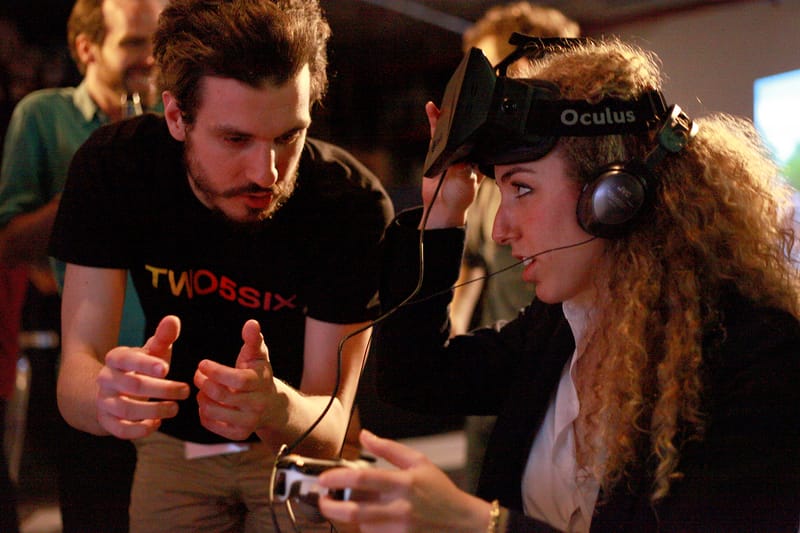Sunset and its trailer will premiere at Kill Screen’s Two5Six conference tomorrow, May 16, and will also be available to play at our (free!) public arcade on Sunday, May 17. RSVP here.
In an impromptu interlude during the first performance of Why? (The King of Love is Dead), just days after the death of Dr. Martin Luther King Jr., Nina Simone, the singer, songwriter, and civil rights activist, remarked:
“Do you realize how many we have lost? Then it really gets down to reality doesn’t it? …We can’t afford any more losses. They’re shooting us down one by one, don’t forget that, because they are.”
Those words captured the dichotomy of desperation and determination that made up a significant part of the black experience during the 1970s in the United States. In a recent chat with Auriea Harvey from Tale of Tales, we spoke about Angela Burnes, the protagonist of their new game, Sunset, and about her escape from that reality.

Image via Wikimedia Commons
The 1960s brought about an era of supposed reform. Hundreds of thousands marched on Washington, desegregation was at hand, important legislative measures were finally taken in the form of the Civil Rights Act of 1964 and Voting Rights Act of 1965. Centuries of activism for the equality of people of color in Western society seemed to have begun to bear fruit.
It became evident by the early 1970s, however, that whatever progress was made suffered considerable shortcomings. The standard practice of redlining—which created a lack of access to business and educational loans, and perpetuated environmental racism, among other issues — continued to harm communities of color across the country. The legislative system failed to address longstanding racial issues and disillusionment became widespread. Those who were still in search of change considered alternative means. It was a time “when people felt the revolution was real,” Harvey explains.
Nina Simone left, Angela Burnes wasn’t far behind.
Harvey pointed to Angela Davis, the political activist, scholar, and author, as an important influence. Angela Burnes, Harvey says, was influenced by Davis’s “idea that other places are not places to be feared, that real change is possible, that it could be radical and that that could be a good thing.”
“The United States is imperfect, I’ll go seek another way of life elsewhere,” was Harvey’s intention for her character. Two years after that famous recording, in this maelstrom of superficial change and deception, Nina Simone left the United States, and Angela Burnes wasn’t far behind.

Upon her excursion to San Bavón, Anchuria, the fictional South American city where Sunset takes place, Angela Burnes “suddenly wasn’t just a black woman living in an oppressive society. She was living someplace more egalitarian.” Harvey speaks about Angela finding somewhere that she regarded as almost a paradise. Angela believed again that people could make a difference. “It was innocent in a way, even naive in a way,” Harvey says.
Angela’s paradise didn’t last long, however, as San Bavón is engulfed in some sort of rebellion. Harvey stressed that although Sunset is centered on the idea of revolution, it isn’t making any sort of commentary on Latin American political history. “We aren’t equipped for that,” Harvey says. “It’s more about us, in Western society, and how we view other cultures and how our culture infiltrates other cultures.” As Angela is confronted with a culture that she doesn’t quite understand, an inner revolution is exposed.
“It’s an isolating thing to be an immigrant to a country. When you don’t have a community to join, you’re just there,” Harvey says. Emigration is another central theme that Tale of Tales wanted to explore in Sunset. Harvey points to her own experience as a migrant to Belgium, about how it can sometimes feel “insidious and strange.” She continues, “We want people to feel that they are also an immigrant to this country.”

Image via Theodor Hensolt
“We went to Cuba as part of the research for the game,” she explains, “I imagine that’s what it was like for Angela, not being able to parse what’s going on around you.” “We stayed in a neighborhood with a woman, who invited us into her home and fed us and made sure we didn’t get too lost,” she said. “It was beautiful there in a way, but it was [also] ruined. There was music everywhere. The sonic atmosphere wasn’t like it is anywhere in Europe or America, it’s very much live music being played everyplace by really good musicians. It’s people singing and playing in the street. You see a little string of little ballerinas going to class. People seemed extremely happy.”
When speaking about how her experience abroad influenced the fictional country of Anchuria, and why Angela Burnes felt compelled to flee America in favor of San Bavón, Harvey hints, “perhaps it’s famous.” Harvey explains that within this fictional space exists a world-renowned composer by the name of Luis Prieto, who’s captivated Angela Burnes. A dedicated BBC program in the game covers the life and accomplishments of the legend. Harvey spoke a bit more about the economy of Anchuria, but I got the feeling she didn’t want to reveal too much more.
You are someone who feels compelled to make a difference
Even though it seems very plausible that Angela Burnes would want to escape the racial hostility of 1970s America—and let’s assume that Anchuria is the place to do that—it remains unclear what exactly motivates her throughout the course of the game.
Harvey suggests that there are various reasons that Angela has decided to stay. One of those is her brother David. He is apparently deeply involved in the revolution, as a combatant of some sort. “He’s the [typical] videogame character,” Harvey says, the one you might find as the main character in a standard first person shooter.
And although Angela is trapped, in a way, she’s also grown fond of San Bavón. “There was something there she cherished, she doesn’t really want to leave,” Harvey explains. You are playing through the perspective of someone who feels compelled to stay and make a difference. Angela feels that “she’s found something worthwhile.” Is this something enough to transform her desperation into hope?

Find out for yourself: come watch the premiere of the trailer and play Tale of Tale’s Sunset before it’s released. Stop in to the Two5Six public arcade on Sunday, May 17, located at the Villain in Brooklyn. The event is free and will feature music by Heathered Pearls and Michna. You can purchase tickets for the rest of the Two5six conference here.





